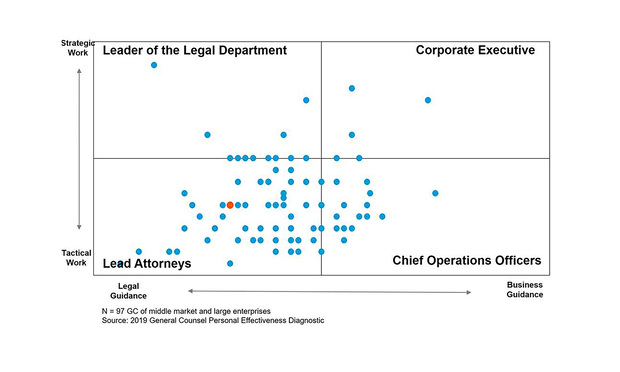General Counsel May Not Be Reaching Their Executive Potential
"Unfortunately, only 1 in 5 GC meet this standard of effectiveness," Abbott Martin, vice president for research in the Gartner Legal and Compliance practice, said. "This is concerning in an environment where many are looking to the GC for leadership."
May 27, 2020 at 04:55 PM
3 minute read

The general counsel dream of leaving Big Law to take a business leadership role in-house may turn out to be elusive.
A new GC poll from the research and advisory firm Gartner Inc. shows reality coming up short.
When Gartner asked them whether their ideal role was that of a corporate executive, nearly half of all GCs—46%—said yes. But when asked if they were able to carry that out, only 8% said yes.
Consequently, many GCs say they are not meeting executive expectations or effectively supporting their boards, Gartner reported. Fewer than half say they play a significant role in identifying and managing emerging issues, providing CEO support, participating in executive corporate initiatives or establishing company strategy.
Gartner has defined GC effectiveness as the achievement of personal objectives, influence with CEOs and contribution to corporate results. "Achieving these three components at least means you've done your job, have the ability to sway decisions when necessary, and help the company prosper," Abbott Martin, vice president for research in the Gartner Legal and Compliance practice, said in a written statement. "Unfortunately, only 1 in 5 GC meet this standard of effectiveness. This is concerning in an environment where many are looking to the GC for leadership."
Gartner has also published a report identifying behaviors common to "personally effective" GCs.
 Credit: Gartner
Credit: GartnerGartner's top tip for GCs is to carve out an executive role. "The most effective GC spend 52% more time on strategy and 42% more time providing business guidance than their peers," Martin said. "They achieve this by having intentional conversations with the CEO and the board about their highest value role and the corporate decisions that most benefit from GC involvement."
Martin advised that GCs "do their best to avoid becoming bogged down in the more tactical nature of day-to-day legal work and instead use the time to provide guidance to executives at the highest level."
When it comes to managing risk, it's best to be proactive, Martin said. He advised that GCs "address this challenge head on" by helping reach a consensus for risk appetite.
"This is about proactively addressing the company's risk exposures—whether legal or not," Martin said.
Gartner places a premium on "ruthless" time management. The firm reports that GCs are spending between a quarter and a third of their time in ways they don't need to. This takes many forms, such as doing work someone else should have done, being in meetings where their involvement was unnecessary, or having their planned schedule interrupted.
"Personally effective GC are ruthless about their time management and as a result have 27 fewer 'wasted' days a year," Martin said. "Simple behaviors can make a dramatic difference in time management. For example, simply announcing your priorities reduces interruptions and empowers staff. GC should also audit their schedules to make sure they align with their priorities."
This content has been archived. It is available through our partners, LexisNexis® and Bloomberg Law.
To view this content, please continue to their sites.
Not a Lexis Subscriber?
Subscribe Now
Not a Bloomberg Law Subscriber?
Subscribe Now
NOT FOR REPRINT
© 2025 ALM Global, LLC, All Rights Reserved. Request academic re-use from www.copyright.com. All other uses, submit a request to [email protected]. For more information visit Asset & Logo Licensing.
You Might Like
View All
Trump Taps McKinsey CLO Pierre Gentin for Commerce Department GC



Longtime Purdue GC Accused of Drunken Driving Hires Big-Name Defense Attorney
3 minute readTrending Stories
- 1GOP-Led SEC Tightens Control Over Enforcement Investigations, Lawyers Say
- 2Transgender Care Fight Targets More Adults as Georgia, Other States Weigh Laws
- 3Roundup Special Master's Report Recommends Lead Counsel Get $0 in Common Benefit Fees
- 4Georgia Justices Urged to Revive Malpractice Suit Against Retired Barnes & Thornburg Atty
- 5How Gibson Dunn Lawyers Helped Assemble the LA FireAid Benefit Concert in 'Extreme' Time Crunch
Who Got The Work
J. Brugh Lower of Gibbons has entered an appearance for industrial equipment supplier Devco Corporation in a pending trademark infringement lawsuit. The suit, accusing the defendant of selling knock-off Graco products, was filed Dec. 18 in New Jersey District Court by Rivkin Radler on behalf of Graco Inc. and Graco Minnesota. The case, assigned to U.S. District Judge Zahid N. Quraishi, is 3:24-cv-11294, Graco Inc. et al v. Devco Corporation.
Who Got The Work
Rebecca Maller-Stein and Kent A. Yalowitz of Arnold & Porter Kaye Scholer have entered their appearances for Hanaco Venture Capital and its executives, Lior Prosor and David Frankel, in a pending securities lawsuit. The action, filed on Dec. 24 in New York Southern District Court by Zell, Aron & Co. on behalf of Goldeneye Advisors, accuses the defendants of negligently and fraudulently managing the plaintiff's $1 million investment. The case, assigned to U.S. District Judge Vernon S. Broderick, is 1:24-cv-09918, Goldeneye Advisors, LLC v. Hanaco Venture Capital, Ltd. et al.
Who Got The Work
Attorneys from A&O Shearman has stepped in as defense counsel for Toronto-Dominion Bank and other defendants in a pending securities class action. The suit, filed Dec. 11 in New York Southern District Court by Bleichmar Fonti & Auld, accuses the defendants of concealing the bank's 'pervasive' deficiencies in regards to its compliance with the Bank Secrecy Act and the quality of its anti-money laundering controls. The case, assigned to U.S. District Judge Arun Subramanian, is 1:24-cv-09445, Gonzalez v. The Toronto-Dominion Bank et al.
Who Got The Work
Crown Castle International, a Pennsylvania company providing shared communications infrastructure, has turned to Luke D. Wolf of Gordon Rees Scully Mansukhani to fend off a pending breach-of-contract lawsuit. The court action, filed Nov. 25 in Michigan Eastern District Court by Hooper Hathaway PC on behalf of The Town Residences LLC, accuses Crown Castle of failing to transfer approximately $30,000 in utility payments from T-Mobile in breach of a roof-top lease and assignment agreement. The case, assigned to U.S. District Judge Susan K. Declercq, is 2:24-cv-13131, The Town Residences LLC v. T-Mobile US, Inc. et al.
Who Got The Work
Wilfred P. Coronato and Daniel M. Schwartz of McCarter & English have stepped in as defense counsel to Electrolux Home Products Inc. in a pending product liability lawsuit. The court action, filed Nov. 26 in New York Eastern District Court by Poulos Lopiccolo PC and Nagel Rice LLP on behalf of David Stern, alleges that the defendant's refrigerators’ drawers and shelving repeatedly break and fall apart within months after purchase. The case, assigned to U.S. District Judge Joan M. Azrack, is 2:24-cv-08204, Stern v. Electrolux Home Products, Inc.
Featured Firms
Law Offices of Gary Martin Hays & Associates, P.C.
(470) 294-1674
Law Offices of Mark E. Salomone
(857) 444-6468
Smith & Hassler
(713) 739-1250






